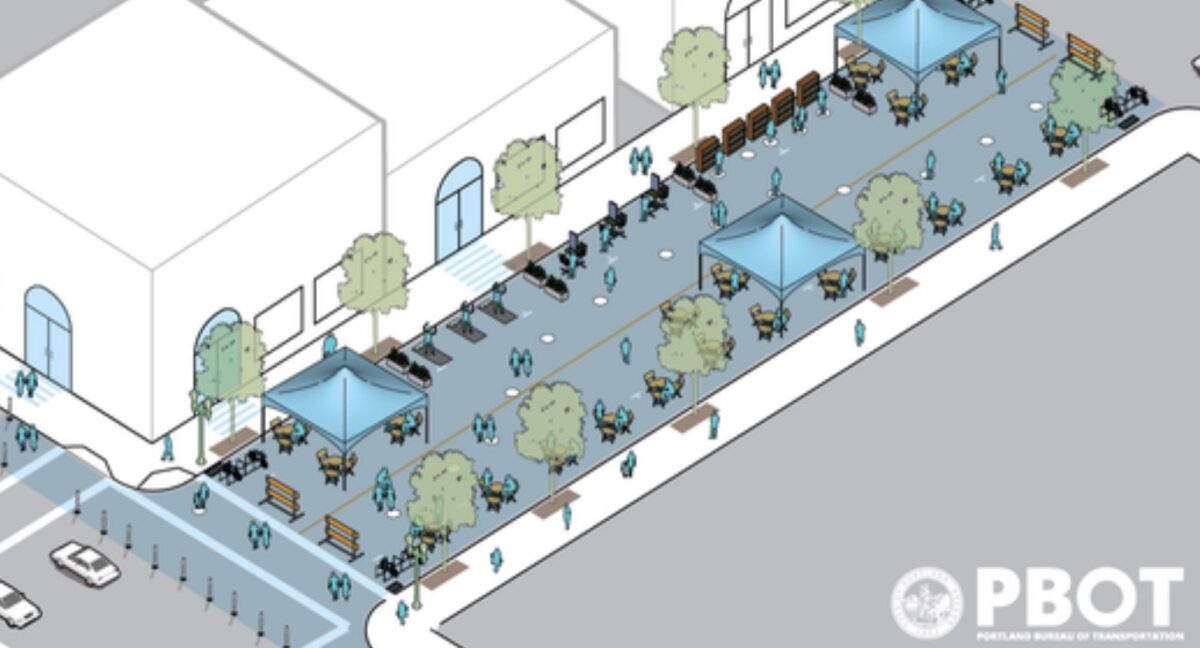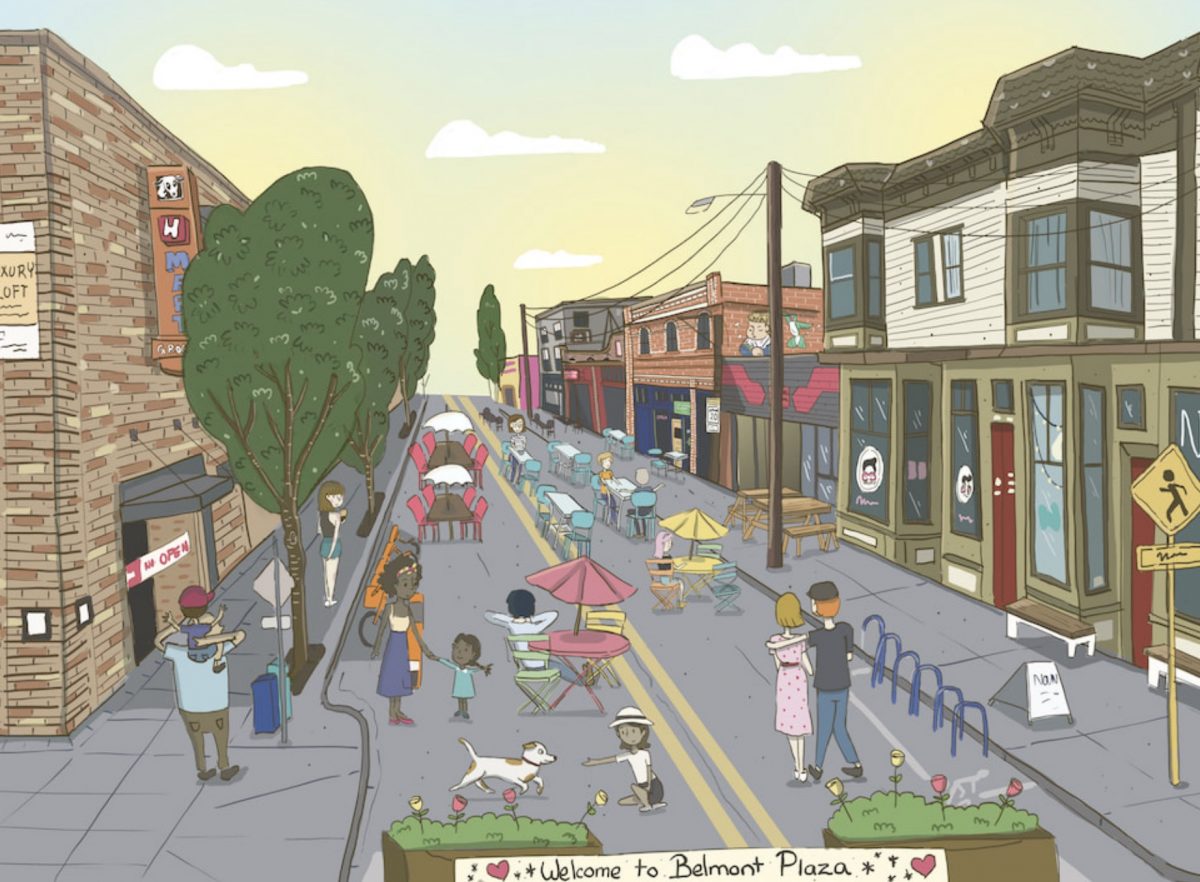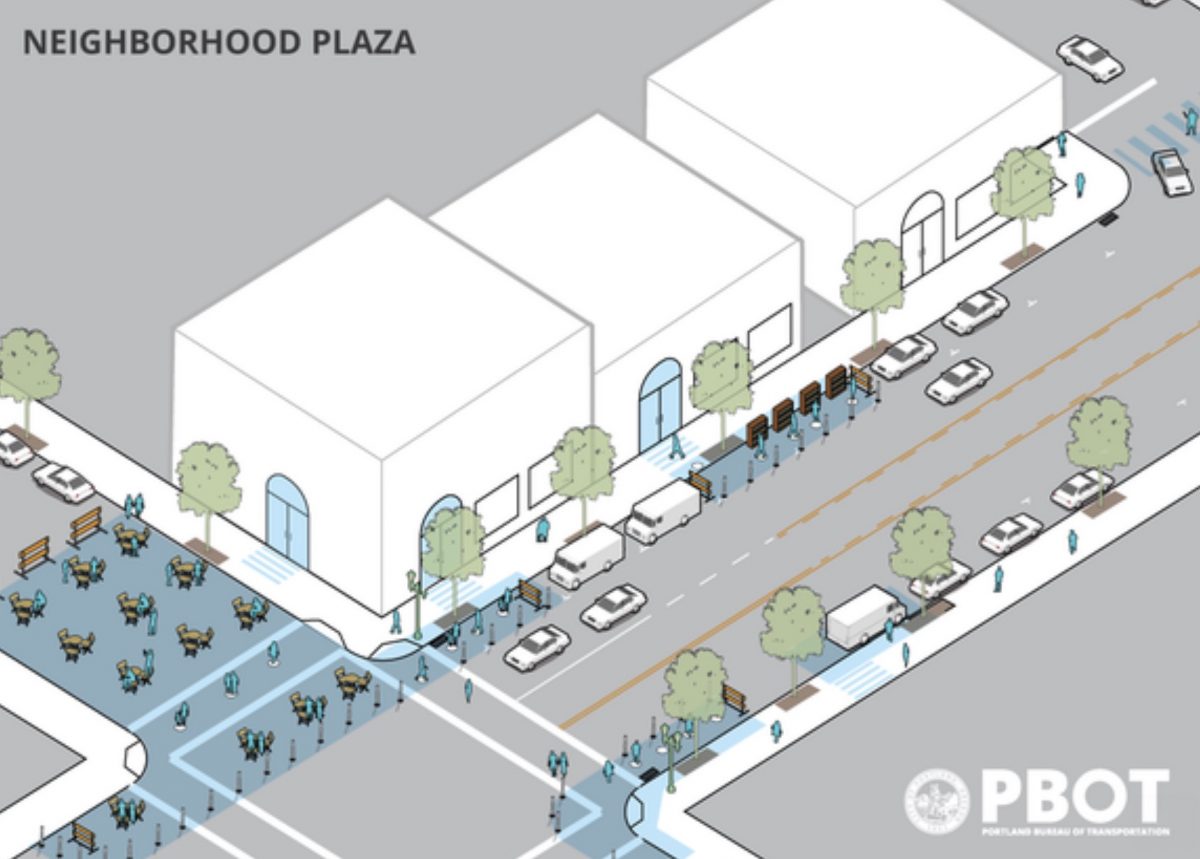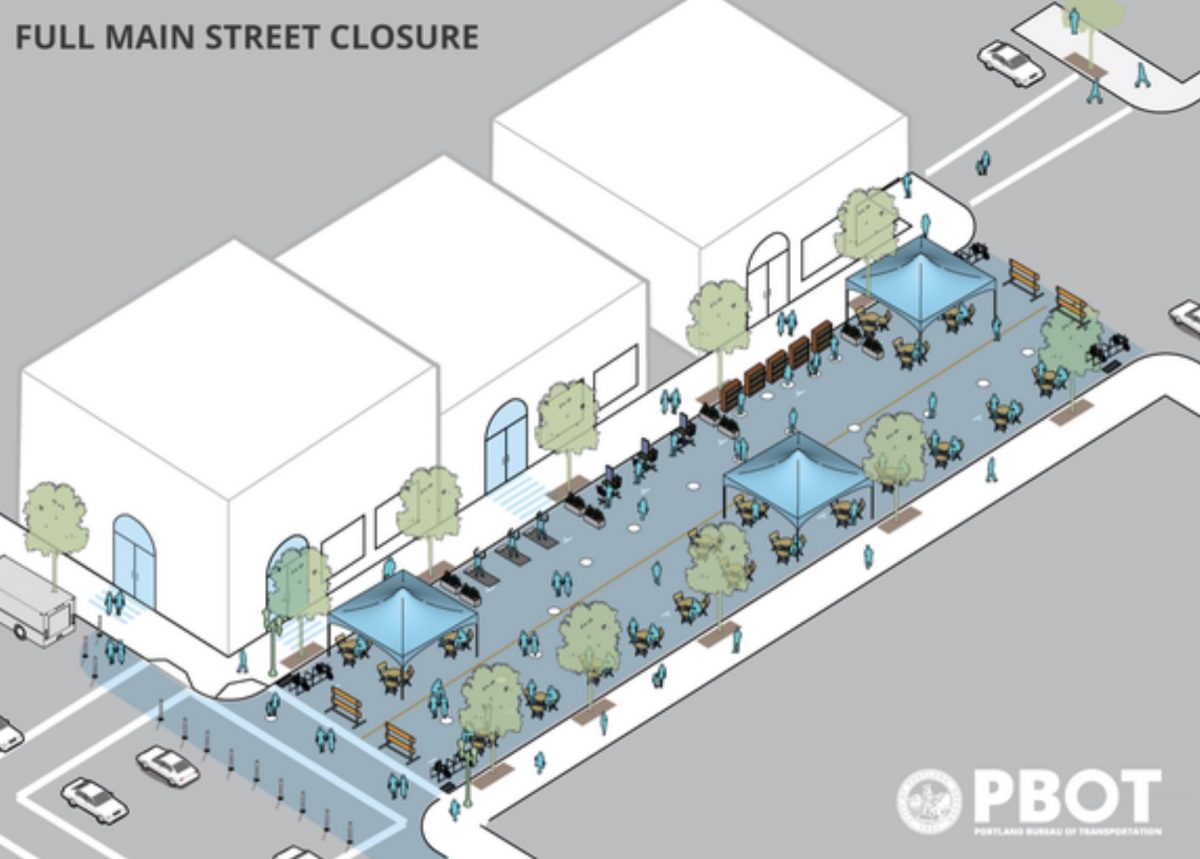
“An opportunity to build the future we want: A future with less people relying on private cars is essential to meeting PBOT’s strategic plan goals.”
— From new Safe Streets strategic plan
As we hinted at last week, the Portland Bureau of Transportation has just launched a new piece of their Safe Streets initiative that focuses on businesses. PBOT has also announced a related, $50,000 grant program for organizations to work with frontline communities.
PBOT has opened a permit application process and released a, “strategic framework for adapting streets as city restarts public life.” Both efforts aim to re-ignite safe business activity by utilizing public space traditionally used as parking lots and transportation corridors.
PBOT Commissioner said the effort will “reimagine public space.”
Business owners can apply online for a free Healthy Business permit which will give them the authority to use sidewalks and streets for a number of uses including: hygiene stations, product displays, queuing space for people or vehicles, tables and chairs for dining, waiting areas, temporary patios or plazas, or any other service or creative idea.
On some dense commercial corridors where demand is highest, PBOT says they will allow entire streets to become carfree public plazas.
Advertisement
In their announcement today they describe three possible plaza types: neighborhood plaza, mini neighborhood plaza, and full main street closure.
Neighborhood Plaza: use of parking spaces with side street partially closed for part of the block.
Mini neighborhood plaza: use of parking spaces with side street partially closed for part of a block.
Full main street closure*: PBOT will not allow full street closures on emergency routes or transit routes.
(*I really don’t understand why PBOT continues to use the word “close”. These streets are not being closed! They are being opened up to more uses than ever.)
PBOT says they won’t supply equipment to demarcate the in-street commercial spaces and they won’t be responsible for maintaining them. This means private businesses will have considerable sway over public spaces. This will be something to watch closely. PBOT says staff that oversees the permit program will, “balance needs of businesses with traffic safety, pedestrian access, public transit, and emergency response needs.”
At this point, the permits will be considered temporary and valid through October 1st.
This new permitting program comes at the same time PBOT is proposing protected bike lanes on Hawthorne Boulevard and is supporting the work of Portlander Zach Katz to create a series of Portland Promenades. Katz is focusing his efforts on carfree plazas on 28th Avenue and Belmont.


Advertisement
$50,000 in grants for “frontline community members”
“This partnership will prioritize organizations working in direct service to or in collaboration with Black, Indigenous and People of Color.”
In tandem with today’s announcement PBOT has invited community organizations to apply for grants and become part of a new Frontline Communities Partnership. “PBOT wants to ensure that the Safe Streets Initiative and all PBOT COVID-19 response efforts account for and support the needs of frontline community members,” says the program website.
Calling it a “partnership opportunity” PBOT has set aside $50,000 that will go to 5-10 organizations that will help advise the agency and take part in structured engagement events between June and October. The grants of up to $10,000 per organization will pay the groups to lead activities that, “Identify community needs to shape and inform how the Safe Streets program and other COVID-19 response efforts can work to meet those needs.”
“This partnership will prioritize organizations working in direct service to or in collaboration with Black, Indigenous and People of Color; Immigrants and Refugees; older adults and people living with disabilities and other populations at highest risk to COVID-19 or the compounding effects of the public health pandemic,” PBOT says.
New plan lays out strategic framework
“As we rally to meet the needs of today we owe it to ourselves to make sure our actions also support our city’s vision of the future.”
PBOT is not letting this opportunity to re-imagine streets go to waste. They’ve released a 30-page plan (PDF) that lays out their Safe Streets approach. “PBOT is carefully considering how transportation behavior has changed and how it needs to change, not just as we recover from this crisis, but to support a sustainable future,” reads a quote from Commissioner Eudaly in the plan’s introduction.
The plan offers a detailed overview of all the actions PBOT has taken thus far and it includes hints at several notable new measures.
To fill gaps in the Slow Streets network, PBOT says they will work with advocates in southwest, southeast (Brentwood-Darlington specifically) and east Portland.
In a section about “supporting community building, social connections, and the rethinking of travel choices” PBOT says they’ll deploy “traffic playgrounds” through their Safe Routes to School program to help families learn the rules of the road.
This plan makes it clear that PBOT is looking into the future well beyond the Covid-19 crisis. “This challenge offers the chance to step back and reevaluate our transportation habits and investment priorities,” it says. Here’s more from the final page of the plan:
“Looking to cities around the world that are further along the curve in Portland we are seeing notable Trends and shifts in transportation Behavior as governments begin to open up society again. Every time we ask Portlanders, they tell us they want a low-carbon, equitable transportation system. They want quiet neighborhood streets reliable and rapid transit, safe bicycling conditions and more reliable vehicle travel.
As we rally to meet the needs of today we owe it to ourselves to make sure our actions also support our city’s vision of the future. A future with less people relying on private cars is essential to meeting PBOT strategic plan goals of managing our transportation assets, providing sustainable mobility choices, and eliminating serious injuries and deaths from our roadways. All of this means a more resilient better connected and equitable future for Portland.”
— Jonathan Maus: (503) 706-8804, @jonathan_maus on Twitter and jonathan@bikeportland.org
— Get our headlines delivered to your inbox.
— Support this independent community media outlet with a one-time contribution or monthly subscription.





